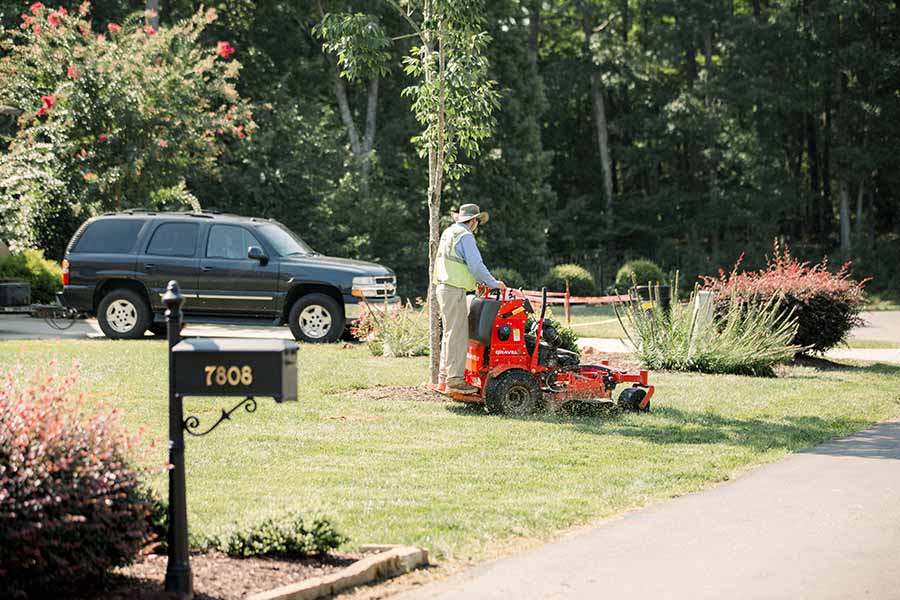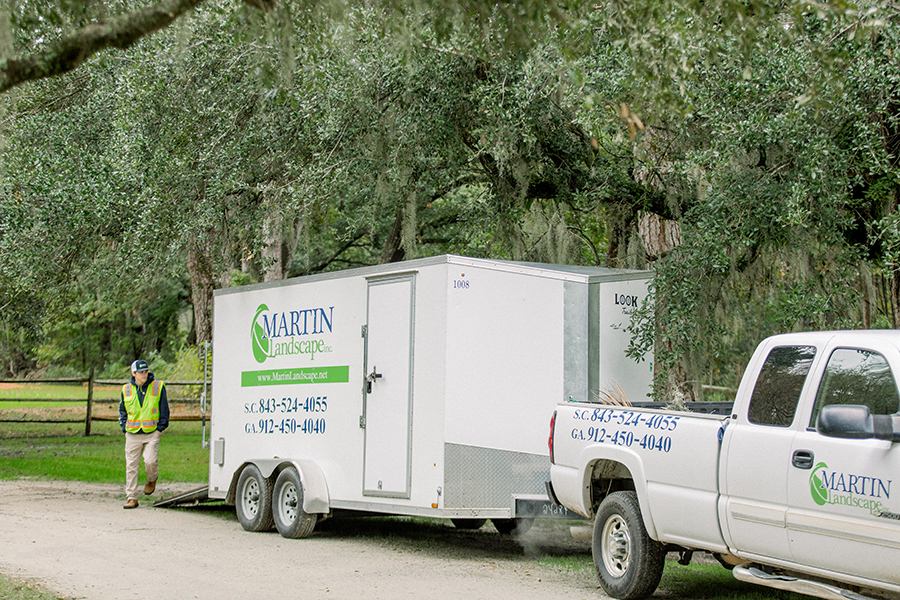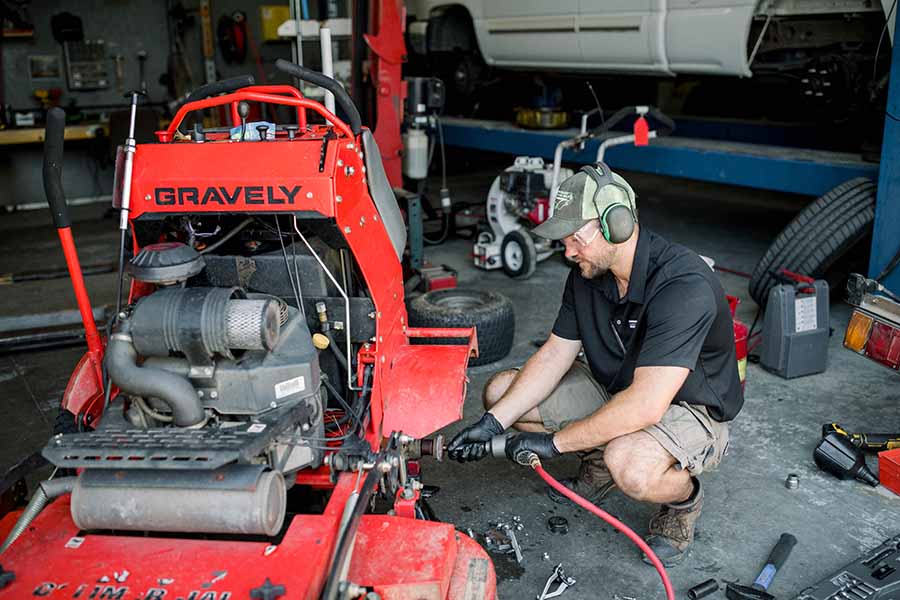Staying Safe on the Job Site
Practicing hazard awareness when landscaping
Landscape contractors and lawn maintenance crews spend all day outside with their equipment. Though all equipment manufactured and or sold in the United States is subject to regulation in their safety features, picking up a chainsaw or sitting down on a riding lawn mower comes with added responsibilities.
Commercial mowers by Gravely® are no different. Like other manufacturers, we too manufacture our equipment in accordance with voluntary safety standards. Additionally, our designs incorporate safety features like guarding and safety interlock systems into the construction of our equipment.
Gravely strongly urges every operator to read their equipment manuals for all the products they own. Our most important goal is to keep you safe in the field so you can come home to your family in the same condition you were in before heading off to the jobsite. To help emphasize the importance of safety and keep it at the forefront of conversations in the outdoor power equipment industry, we put together a snapshot of safety guidelines to be mindful of when entering each jobsite. Just be aware these are only the highlights. Detailed safety information is included in your operator's manual.
If you don't have an operator's manual for your Gravely zero turn mower, ask for one from your local Gravely dealer or download one online for free at gravely.com.
Wear personal protective equipment
Personal protective equipment, or PPE, refers to the protective gear that's recommended while working with outdoor power equipment. This includes ear plugs, safety goggles and steel toe boots, at a minimum. Even if you're safely nestled into the seat of a Gravely zero turn lawn mower, clothing choice is a factor.

1. Eye protection
Never expect flying debris to limit itself to coming straight out of the discharge area. When operating close to obstacles, debris can ricochet off objects and back toward the operator, and that's one reason safety goggles must always be worn during operation. Goggles are especially important when trimming or edging. Trimmers have less guarding and their ability to be held at different angles doesn't prevent operators from using them in ways where discharge can be directed directly at an operator's face.
Glasses alone won't suffice. Safety eyewear includes shielding that wraps around the top, bottom and sides of your eyes. If you have prescription lenses, look for top, bottom and side shields that can attach to the frames.
2. Hearing protection
Never think a lawnmower mower is quiet enough to go without hearing protection. According to the Occupational Safety and Health Administration (OSHA), exposure to noises over 85 decibels after an eight-hour period can lead to hearing loss. To put that into perspective, normal conversation happens at around 60 decibels, so it doesn't take much more noise for hearing damage to occur. Don't go without now and regret it later – wear earplugs or earmuffs, whichever is preferred.
3. Loose hair and clothing
Outdoor power equipment, though well-guarded for safety, can never be 100% guarded. Moving parts on trimmers, chainsaw blades, hedge trimmers and mower belts all have the potential to snarl long hair, clothing or jewelry. Always operate outdoor power equipment with tightly fitting clothing with long hair tied back.
4. Proper footwear
Closed toe at a minimum, but steel toes are best. Don't just consider the protection from the top of your footwear, but think about which boots are waterproof and have good traction on slippery surfaces.
Stay visible
In many cities and municipalities, operating in the roadway may be prohibited, but there's no way to completely avoid operating near traffic. Terraces in residential areas and highway medians in the country need to be cut. Stay as visible as possible by wearing bright, high-visibility attire and always remain alert to traffic. The distracted driving epidemic, which claimed the lives of 3,166 people in 2017 alone, isn't getting any better, so never assume drivers are aware of your presence in or near the roadway.

Contractors leaving their equipment parked in the road also need to be careful. Like semitrailer drivers stopping for the night, place bright orange cones around your equipment so drivers can see the equipment is parked and know to slow down and take measures to avoid hitting it.
Safe lawn mower operation
1. Slope operation
Commercial lawn mowers come in different varieties. Gravely offers a full lineup of zero turn riders, stand on mowers and walk behinds, each with different ratings for safe slope operation. The maximum slope operation for a commercial zero turn mower is 15 degrees. The maximum slope operation rating for stand on and walk behind mowers is 20 degrees, however that reduces to 10 degrees when attachments are installed.
To minimize the risk of a rollover, always mow up and down slopes; never across, and never mow on a slope that's wet from morning dew, irrigation or a recent rain shower.
If you start losing traction while mowing a slope with a zero turn mower, disengage the blades, slowly turn away from your cutting row and proceed slowly down the hill. If you sense a total loss of control on a slope, slowly return the steering levers to the neutral position, engage the parking brake, stop the blades and the engine.
2. Operating near drop-offs
Don't operate near drop offs, ditches, embankments or bodies of water. If a wheel goes over the edge of a cliff or drop-off, or if the drop-off suddenly caves in, the unit can tip over unexpectedly. Only use small walk behind lawn mowers when operating in these hazardous areas.
3. Using ROPS
Rollover protection structures (ROPS) are designed to protect the operator in the seat of a zero turn riding mower in the even of a rollover accident. The ROPS, which raises to a height taller than the operator, protects the operator if they're wearing their seatbelt. However, ROPS in the raised position will not protect an operator who doesn't have their seatbelt fastened.
-
- If the ROPS hoop is in the raised position, operator must have their seatbelt fastened
- If the ROPS hoop is in the lowered position, operator must not have their seatbelt fastened.
4. Be aware of your surroundings
If you're working in the yard of a home with children or pets, survey the area to be mowed beforehand to clear it of any children's or pet's toys and any other objects that could be turned into a projectile if run over by rotating lawn mower blades.
When working in areas with kids or pets nearby, remain alert to the possibility of children wandering into the cutting area. Children, especially those who have been given lawn mower rides in the past, are attracted to mowing activity. Require those whose property you're cutting to keep their children inside and under the watchful eye of a responsible adult.
5. Watch the sun
Never operate outdoor power equipment while under the influence of alcohol or drugs. Absolute sobriety is the only acceptable blood-alcohol content when driving and using outdoor power equipment. Additionally, stay at home if you're feeling ill – power equipment operation requires you to be at your best.
Protect yourself from the elements. Landscapers in the south know better than anyone that working long hours in the summer heat can take a toll, quickly. If you're not already wearing clothing that covers your entire body, apply sunscreen or take other measures that minimize sun exposure. Large-brimmed hats and sunshade kits that install to zero turn lawn mowers are a favorite for landscapers. Don't forget to hydrate, either. You sweat more body fluid than you know, even if you're spending most of your day sitting on a comfortable Gravely Pro-Turn®.
Servicing a mower yourself
Many lawn maintenance businesses have their own shops, and it's common for them to do service on their own. While you may be a seasoned veteran in service work, it's important to prevent yourself from getting into an automatic routine where muscle memory replaces awareness. Be patient; never try to complete service assignments quickly. When servicing a machine, remember to always park the unit on a flat, level surface, engage the parking brake, turn the key to the off position and to wait for all moving parts to stop and for hot parts to cool. Additionally, reread the safety instructions in the manual under the heading titled, "Service," and follow along with the service procedures as they are written in the operator's and engine manuals.
-
Handling blades
Commercial landscapers, especially those mowing in abrasive conditions, sharpen blades multiple times per week. Don't underestimate the ability for a dull blade to cut. Any blade, sharp or dull, should be wrapped in a cloth or other protective material, and the person handling the blade should be wearing thick, sturdy gloves. Additionally, know that whenever the PTO belt is wrapped around the spindle pulleys and the belt has tension, rotation of one blade will also rotate the other blades.
Never attempt to weld or bend a blade back into shape; discard blades if they are damaged and only sharpen if you have proper training and experience.
-
Use jack stands
Never trust a hydraulic jack. Hydraulic jacks can fail without warning, causing the load being supported by them to fall and potentially pin or crush anyone under the machine being serviced. Always use jack stands to accompany a jack when additional clearance is needed to access parts or complete service under a lawn mower, and ensure the jack stands are in a stable position.

To see the complete list of safety rules for your equipment, read the safety instructions in the front of the operator's manual supplied with your Gravely equipment. If you didn't receive an operator's manual with your equipment, ask your dealer for a copy of the manual or find it online by clicking here.
